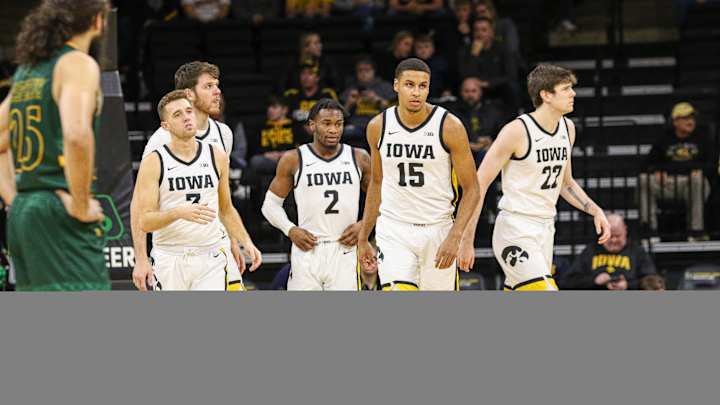Iowa Basketball Notebook: Home for Holiday

Fran McCaffery’s players got to go home for Christmas this year.
That, the Iowa coach said on Tuesday, was a good thing.
The Hawkeyes got a holiday break after last Tuesday’s 93-62 win over Southeastern Louisiana. They’re back on campus now to prepare for Wednesday’s game against Western Illinois (10-3) at Carver-Hawkeye Arena, the final non-conference game before getting back into Big Ten play.
It’s different than last year, when the Hawkeyes and the rest of the Big Ten played on Christmas weekend because of the COVID-19 pandemic.
“Last year was an absolute surreal experience,” McCaffery said. “We’re in a downtown hotel — 31 floors and nobody in it but us. There’s nobody on the streets. Nobody at the games. We did what we had to do to play the season. We were actually happy to be together, happy to be playing. But you didn’t have that family time last year.”
McCaffery said he tries to schedule around Christmas to give players time off, because they’re usually playing in tournaments over Thanksgiving.
“We’re typically traveling around Thanksgiving, so the kids don’t see their families around Thanksgiving,” he said. “We’re pretty much all business around that holiday.”
The Hawkeyes had nine days off between the 73-53 loss to Iowa State and the 94-75 win over Utah State in Sioux Falls, S.D. on December 18. That break, plus the time off for Christmas, has helped them get healthy.
“We had a lot of nagging stuff going on,” McCaffery said. “Nothing to really preclude anybody from playing, Those guys needed a little bit of a break, get healthy.
“Now it’s just pretty much singular focus the rest of the way. So I think, from that standpoint, we got healthy, got a chance to have a little bit of family time. And now we focus on this game (against Western Illinois), and the rest of the Big Ten schedule. Essentially, you don’t lift your head up until April.”
Other notes from the media availability:
• McCaffery said center Josh Ogundele, who suffered a sprained ankle late in the win over Southeastern Louisiana, won’t play against Western Illinois.
“He’s coming along,” McCaffery said. “He won’t play tomorrow. It wasn’t a real, real bad one. I expect by next week he’ll be back.”
• The Big Ten announced on Tuesday a change in its COVID-19 forfeiture policy. Instead of games being declared forfeits if a team can’t play because of the virus, games could be considered forfeits, no-contests, or will be rescheduled.
According to the conference:
— The number of competitors available – seven scholarship players for women’s and men’s basketball – and the availability of at least one countable coach will be factored into the decision-making process. A team that is below the number may still decide to compete if deemed safe by appropriate medical personnel (i.e. the decision to postpone a competition will not be automatic even if a team is below the number).
— A team that is not below the number of requisite competitors and a coach may still determine that it is unsafe to compete. In such a case, forfeiture will not be automatic, but an institution would need to demonstrate to the conference office, including the Big Ten’s Chief Medical Officer, the circumstances that have led to a determination that it would be unsafe to compete. A team that does not compete, and is unable to demonstrate why it is unsafe to compete, will be assessed a forfeiture. Postponed games that do not result in forfeiture but are unable to be rescheduled will be declared “no contests.”
“I think that was a wise move,” McCaffery said. “We make prudent decisions that are in the best interests of our student-athletes. So I think you make the attempt, and every effort, to reschedule. When teams get healthy, you reschedule. OK, you might have to play three games in six days or seven days, which is not what we obviously want to do. But we don’t want to play when we have some guys that have COVID. We’ll postpone rather than forfeit, and I think that’s a smart move.”
